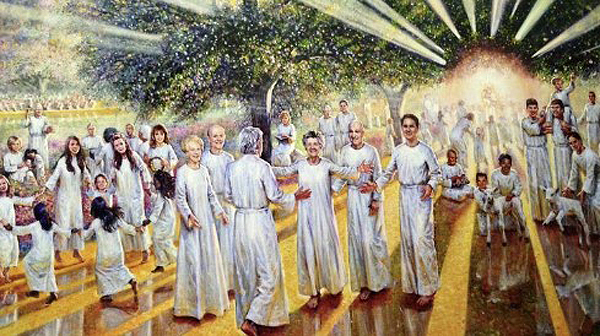|
Joyful Reunion by Kenneth Turner No More Goodbyes |
|
|
The science fiction story Winter on Sharlania describes a man named Riif Kenshtor on the far away planet Mijlania taking a trip to spend some time with a friend on Sharlania, closest of the planet's three moons. Mijlania is a world of warm oceans and many thousands of islands, but no continents. Its uniform mild climate is similar to the continual mid-70s degrees Fahrenheit temperatures of Loja in south-central Ecuador on earth. In contrast, due to the axial tilt of Sharlania much of the moon experiences seasonal changes similar to those on earth. Sharlania also features a few oceans and several continents, some with great plains and woodlands, and mountain ranges of varying heights. Riif boarded a shuttlecraft for the short trip to Sharlania, where he landed near a small lake glazed with ice surrounded by hills wrapped in white in the northern hemisphere. He was welcomed into his friend's warm, inviting lakeshore home. Over the next month, in addition to the hospitality of his host, Riif saw many extraordinary wonders of the moon and enjoyed culinary delights not had on Mijlania. Most of all, the warm friendships he formed transformed the place into what he imagined heaven would be like. When the shuttlecraft came to return Riif to Mijlania, he recalled the joy, peace, contentment, and togetherness he experienced. Instead of bidding his friends farewell, he waved away the shuttlecraft and remained on Sharlania with them. In his second letter to the Christian church at Corinth, written around 56 AD, the apostle Paul shared in the third person an extraordinary experience he had 14 years earlier (2 Corinthians 12:2-4). At that time, while preaching the gospel in Lystra, a hostile mob formed who stoned him (Acts 14:8-20). His friends thought he was dead. In his explanation of what happened, Paul himself did not know whether he was in or out of his body. He said he was caught up to the "third heaven." In the Bible, the "first heaven" refers to the sky or atmosphere around the earth; the "second heaven" refers to the celestial realm where the sun, moon, and stars reside; and the "third heaven" refers to the dwelling place of God -- Paradise. What Paul heard and saw in Paradise was so wonderful that it was beyond his capacity to describe. One can imagine that he did not want the vision to end or have to return to earth from the joy of the timeless presence and glory of God.
Paul may have had this experience in mind in the first letter he wrote to the church in Thessalonica about nine years later (51 AD). In addition to calling on believers to live holy, sanctified lives, he wanted to encourage and comfort them with the assurance that because they believed in the death and resurrection of Jesus, they would also see the Paradise of God when the Lord Jesus returns to take them home.
They would see the new country that Abraham and all throughout history who trusted in the Lord Jesus (Hebrews 11:8-16) desired, and the new city with twelve foundation stones named after the twelve apostles, and twelve gates named after the twelve tribes of Israel. It would be a place where the riches of God's grace, beauty, and goodness are fully manifest. Most of all, they would experience the consummation of their reconciliation with God (Romans 5:8-10), and reunion with friends and family who trusted in Jesus, nevermore to part. Near the conclusion of Ridley Scott's 2000 epic historical drama film Gladiator portrays the moving scene of the last moments on earth of the Roman general Maximus Decimus Meridius. Having fulfilled his purpose and succumbing to his wounds after defeating his enemy in the arena, his spirit was taken to an open door. Walking through it led him to an abundant field of wheat, where he could see a short distance away his wife and son who had gone before there to eagerly welcome him home. This resonates with the phrase "gathered to his people," which appears several times in the Bible (Genesis 25:8-17, 35:29, 49:33; Numbers 20:24, 27:13). It was an ancient Hebrew expression referring to the death of the body and the gathering of the person's spirit or soul to his ancestors among the people of God in the afterlife. Many of us have family and friends that are near and dear to our hearts. They add an incalculable richness and joy to life, and they are sorely missed when they leave our lives. While Riif Kenshtor was able to remain in joyful fellowship with his friends on Sharlania and General Meridius was reunited with his wife and son, those who trust in the Lord Jesus have something real and much better than imaginable. We will like God's people in the Bible enjoy fellowship with Him and be reunited with dear friends and loved ones gone before us when our lives on earth are done. If you have not trusted in the Lord Jesus for the forgiveness of your sins, please do so today. The invitation to drink freely of the water of life coming from the throne of God is for you (Revelation 21:1-4, 22:17). Those who believe the gospel of Christ have the assurance that they will be gathered to their loved ones in the Lord again with no more pain, tears, or death (1 Corinthians 15). No more goodbyes. |
|
| What Is the Gospel? | What Must I Do to Be Saved? | Home | Contact Us | Return | |

